Welcome to Saturday Sparks! This week, we’re stepping onto the fairway with disc golf, a sport that blends the strategy of traditional golf with the casual fun of tossing a flying disc. Played on outdoor courses that wind through fields, trees, and trails, disc golf is as much about enjoying the fresh air as it is about perfecting your throw.
The game is simple in concept: you throw a disc from a starting point toward a metal basket, aiming to complete each “hole” in the fewest throws possible. But beyond the basics, disc golf invites players to develop technique, strategy, and consistency, whether that means mastering different types of throws, learning how to adjust for wind, or navigating tricky course layouts.
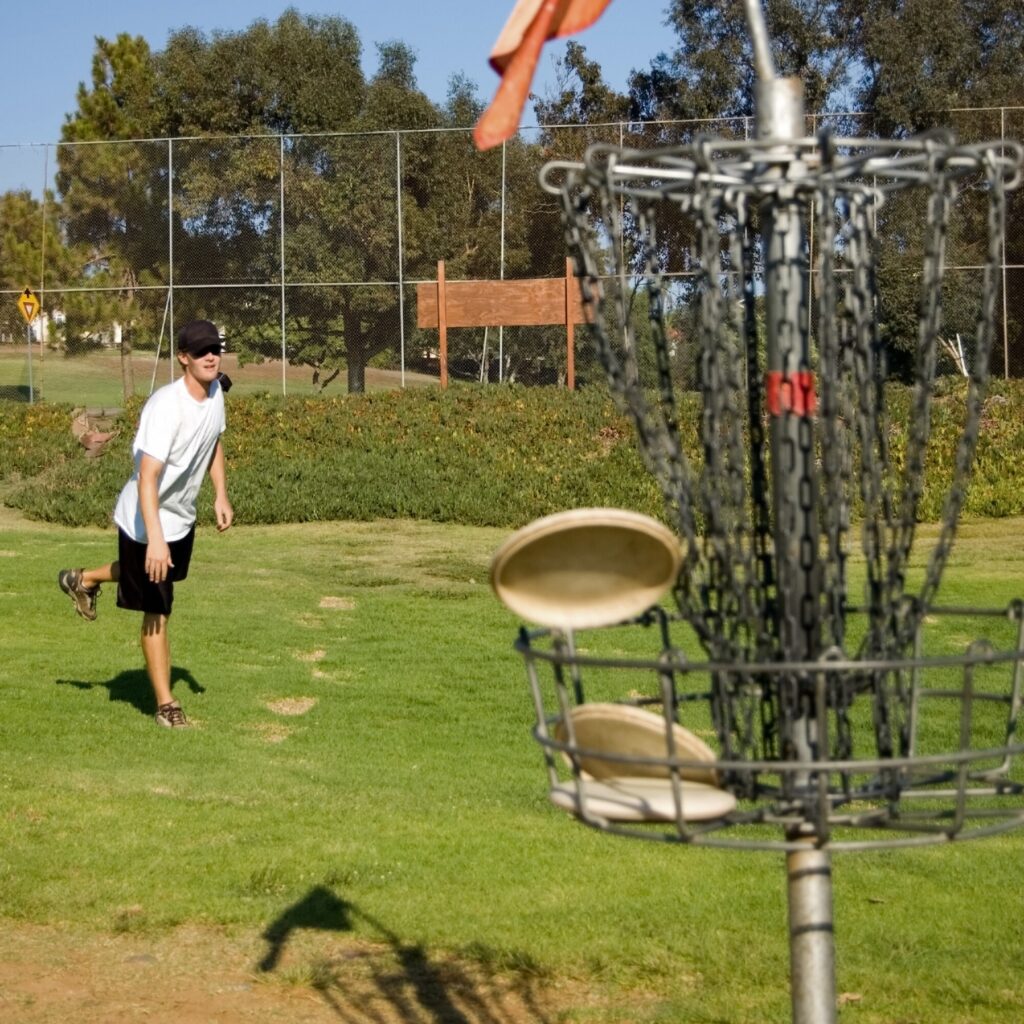

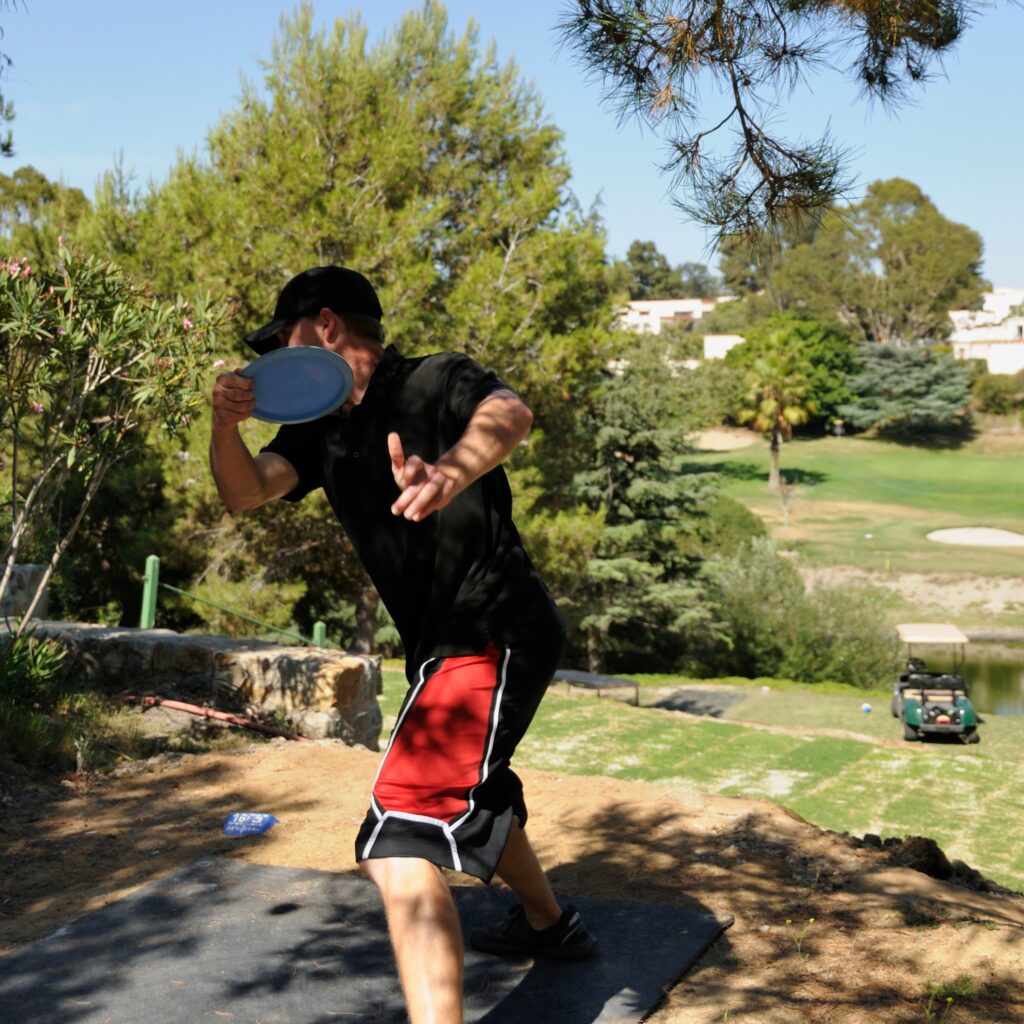
Accessible to all ages and skill levels, disc golf is affordable, easy to learn, and endlessly rewarding. Whether you’re out for a friendly round with friends, practicing solo, or exploring new courses in your area, it’s a sport that offers both challenge and relaxation. With every throw, you’ll find yourself not just playing a game, but also discovering new ways to connect with nature, movement, and community.
What is Disc Golf?
Disc golf is an outdoor sport that shares many similarities with traditional golf but replaces clubs and balls with specialized flying discs.
The objective is the same: complete each “hole” in the fewest number of attempts possible.
Instead of aiming for a cup in the ground, players aim to land their disc in a metal basket fitted with chains that help catch and stop the disc.
Courses typically range from 9 to 18 holes, with each hole having a designated tee-off area and a basket target.
Players follow the course in sequence, keeping score based on the number of throws it takes them to reach the basket.
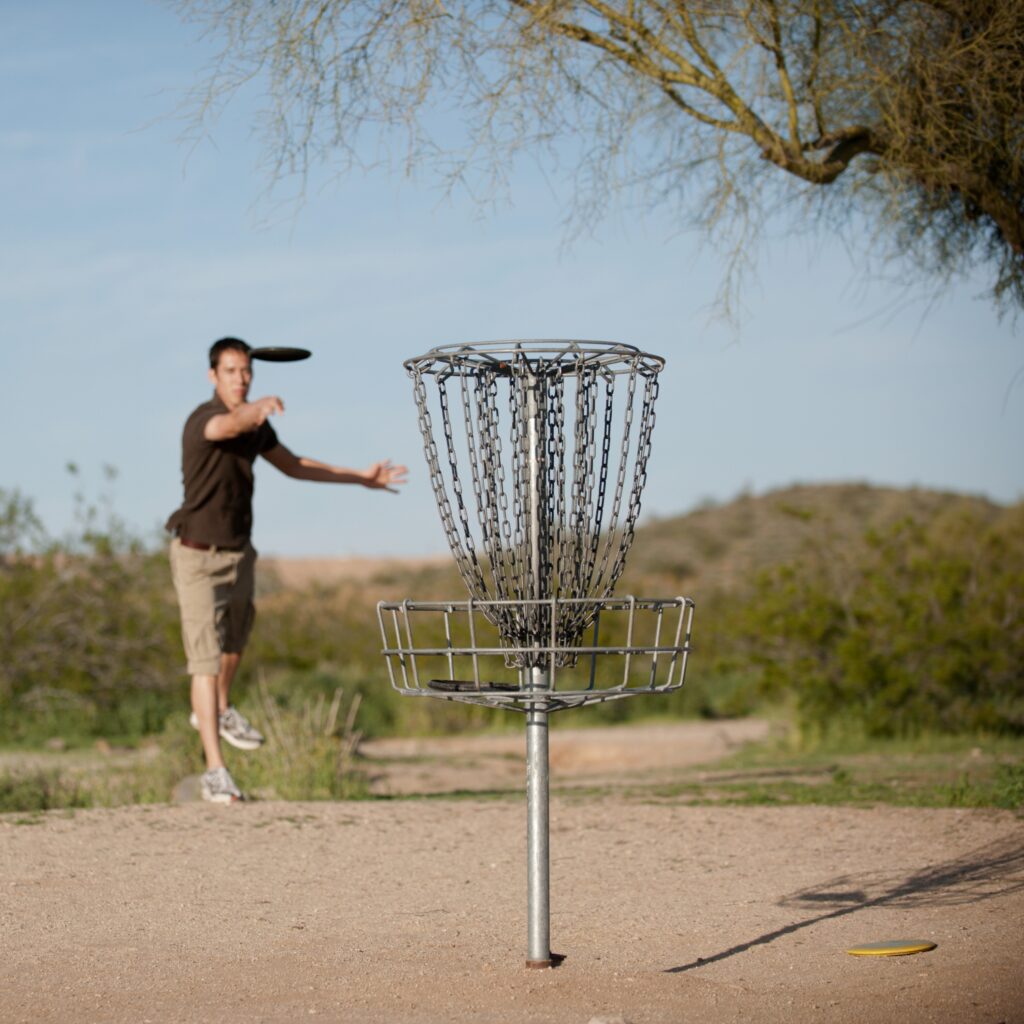
Just like in golf, holes vary in length, layout, and difficulty, some are wide and open, while others weave through wooded areas that require accuracy and strategy.
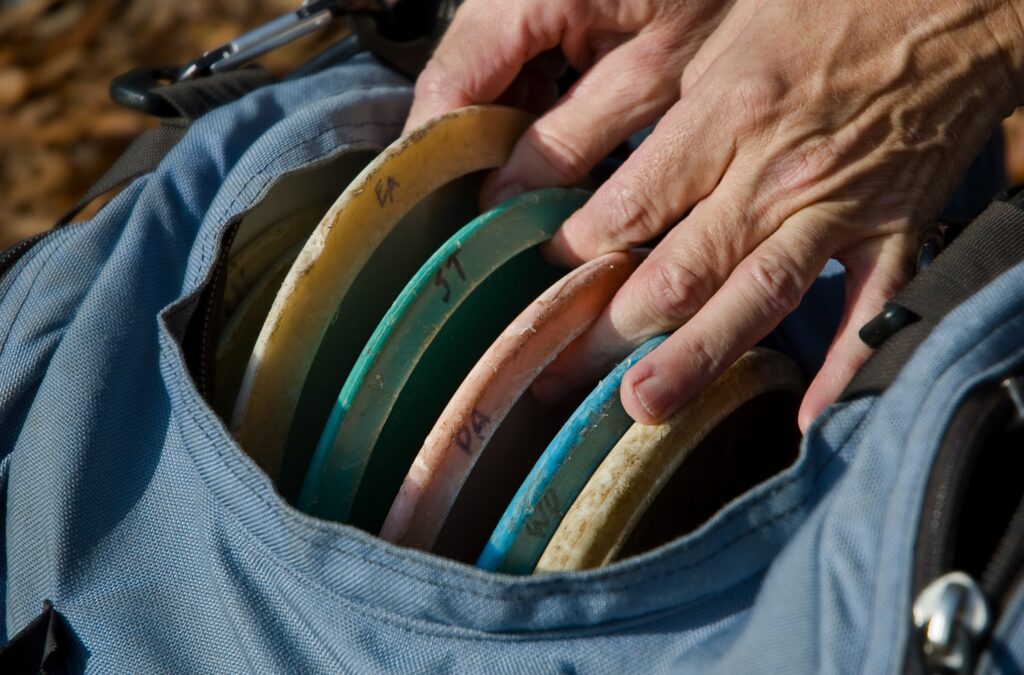
Discs used in the game are designed for different purposes, like golf clubs. Drivers are shaped for long-distance throws, mid-range discs provide control for medium shots, and putters are crafted for accuracy at close range.
Factors like disc weight, stability, and grip also influence how a disc flies, giving players the chance to refine technique and build a collection tailored to their style.
Because of its straightforward rules and minimal equipment requirements, disc golf has become one of the fastest-growing outdoor sports. It can be played casually for fun and relaxation or competitively in leagues and tournaments, making it accessible for everyone from beginners to seasoned athletes.
Benefits of Disc Golf
Disc golf offers a full-body workout. Each throw engages your shoulders, core, and legs, while walking the course builds endurance and cardiovascular health. Over the span of 18 holes, you may walk several miles, making it a surprisingly effective way to stay active.
Courses are often set in parks, wooded areas, or open fields, offering fresh air, natural scenery, and the calming effect of being in nature. Spending time outdoors supports well-being. Playing regularly can help reduce stress, boost mood, and promote a greater sense of connection to the outdoors.
It sharpens focus and concentration. Each shot requires strategy, choosing the right disc, gauging distance, reading wind, and adjusting your throw. This mental stimulation helps improve decision-making and concentration while encouraging patience and problem-solving.
You can play at your own pace. Some players enjoy a quick, casual round, while others take their time and treat it as an opportunity for exercise, skill development, or friendly competition. There’s no pressure, it’s as relaxed or as challenging as you want it to be.
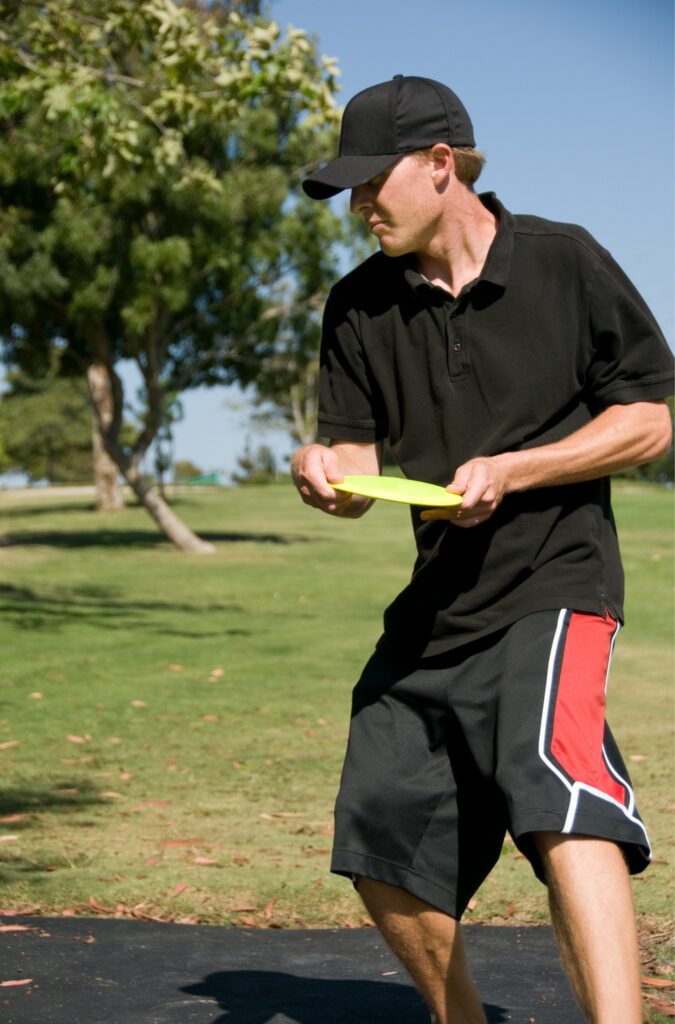
It’s affordable and accessible. Unlike some sports that require expensive memberships or extensive gear, disc golf is one of the most budget-friendly activities. Many courses are free to use, and a beginner can start with just a couple of discs. This makes it a hobby that’s easy to pick up without a large financial commitment.
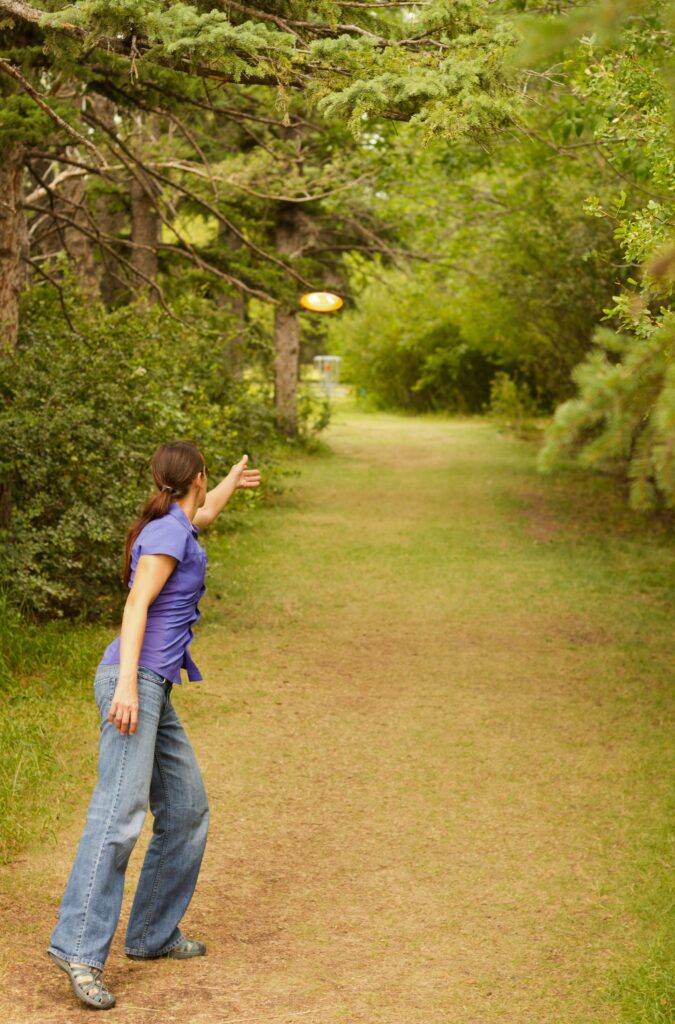
It offers endless variety. With courses ranging from wide-open fields to wooded trails, and discs designed for different types of throws, disc golf constantly presents new challenges and opportunities.
Different throwing styles, flight paths, and course layouts push you to refine accuracy and creativity, making each round feel fresh and engaging. The sport continues to evolve with you, ensuring there’s always something new to learn and enjoy over time.
It’s great for all ages and abilities. From kids learning coordination to adults seeking an enjoyable form of exercise, disc golf is inclusive.
Disc Golf doesn’t demand high levels of physical fitness to get started, and courses can be adapted to suit different skill levels.
It is perfect for friends, families, or groups who want to spend time together in a relaxed, outdoor setting. The sport naturally balances fun and competition, making it accessible for beginners while still engaging for experienced players. The laid-back pace allows for plenty of conversation and laughter between throws.
It builds community. Disc golf has a welcoming culture, with clubs, leagues, and tournaments available for those who want to get more involved. Playing with others often leads to new friendships, shared learning, and a sense of belonging within the disc golf community.
Getting Started
All you need is a disc and a place to play. One of the best things about disc golf is how little equipment is required to begin. A single disc (or two, if you’d like options) is enough to get you started, and there are courses all over the country, often free to play and located in local parks or outdoor recreation areas.
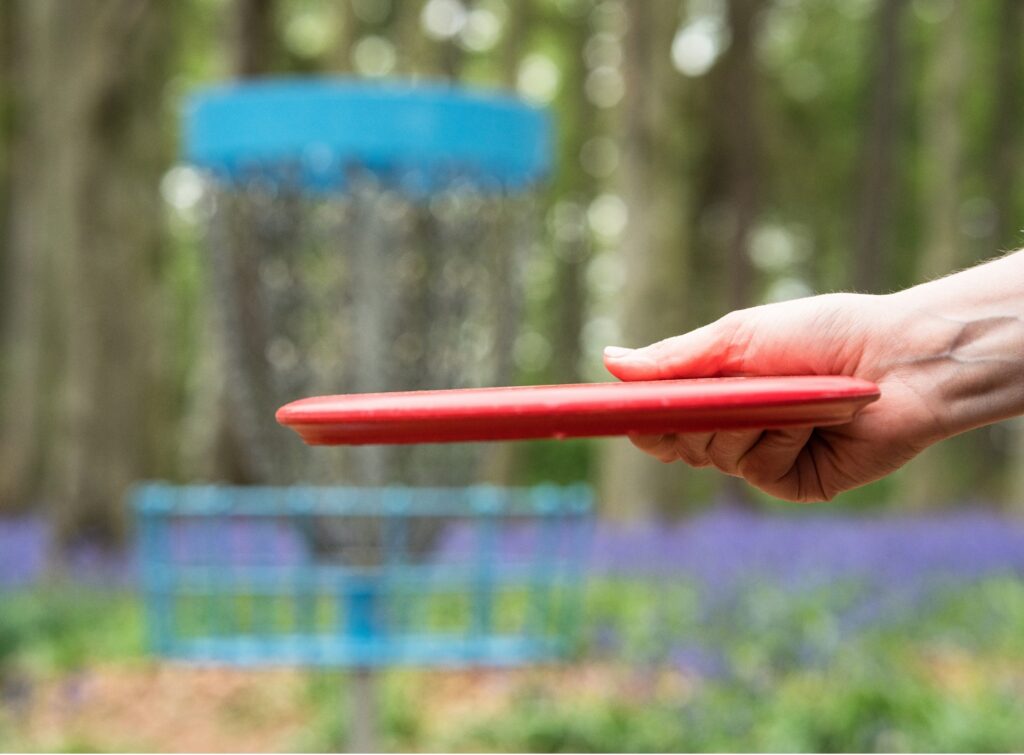
Start with the basics. Learn how to grip the disc properly and practice simple throws like the backhand and forehand.
These foundational techniques will help you understand how the disc flies and give you more control as you play. Don’t worry about advanced throws right away, just get comfortable with the basics.
Focus on fun, not the score. When you’re starting out, it’s less about keeping score and more about practicing your throws and enjoying the game. Every round is a chance to learn something new, and consistency will come with time.
Disc golf is a social sport, and playing with friends or joining a local league is a great way to improve your skills while having fun. Many communities host weekly meetups or casual tournaments that welcome beginners, making it easy to find encouragement and camaraderie.
While you only need one disc to start, you may eventually want to add a few more. Drivers, mid-range discs, and putters are designed for different throws and distances. Experimenting with a small set can help you learn how discs perform in various situations.
Learn the layout of a course. Disc golf courses vary in length, terrain, and difficulty. Some may weave through wooded areas or near waterways requiring precision, while others are wide open, favoring distance throws. Walking through the course before playing or checking the posted map can help you plan your shots and avoid surprises.
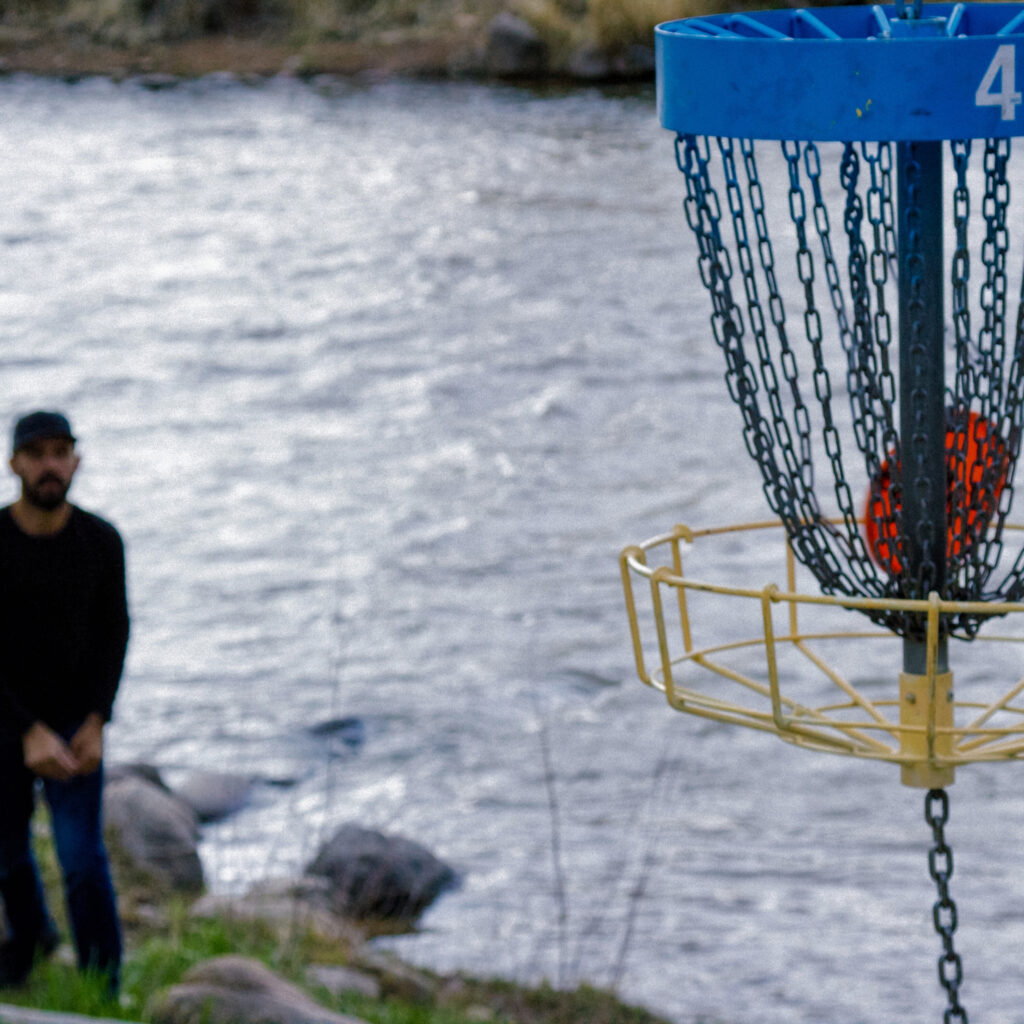
Practice regularly. Like any sport, disc golf improves with consistency. Even short sessions of practicing throws in an open field can help you refine technique, build strength, and gain confidence before tackling full courses.
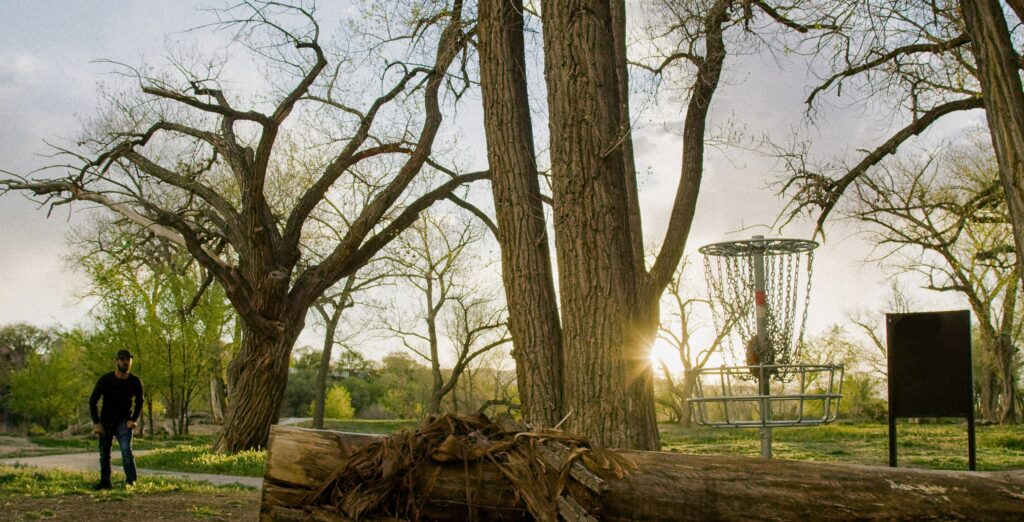
Resources
Disc retailers and shops. Getting started in disc golf doesn’t require much, but having the right discs and gear can make a big difference. Local sporting goods stores, online retailers and specialty disc golf shops offer discs, bags, and accessories for every level of play. Staff members can often provide recommendations tailored to beginners, helping you choose discs with the right weight, stability, and grip.
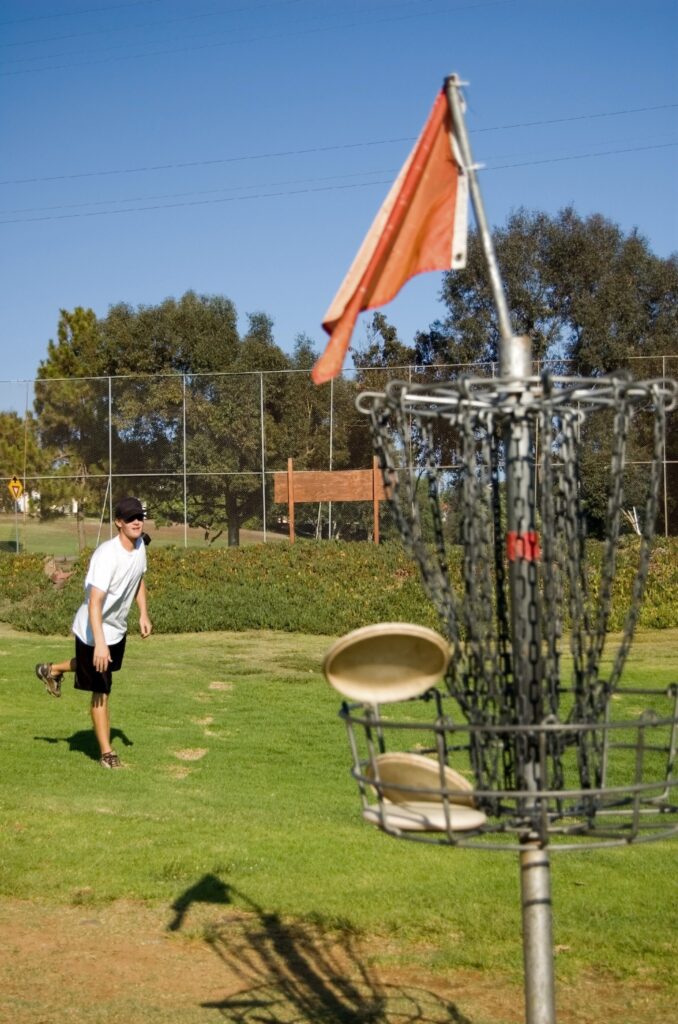
Local courses and parks. Many public parks and recreation areas feature disc golf courses that are free to play. Websites and mapping apps dedicated to disc golf, such as course directories, can help you locate nearby courses and even check reviews, layouts, and difficulty levels before your visit.
Disc golf clubs and leagues. Joining a local club or league is one of the best ways to learn the game, meet other players, and improve your skills. Clubs often organize group outings, beginner-friendly clinics, and casual tournaments that create a welcoming atmosphere for all levels.
Community events and tournaments. Many areas host disc golf events, from small local competitions to larger amateur tournaments. Even if you’re not ready to compete, attending an event can be a great way to see skilled players in action and get inspired.
Books and magazines. For those who like to dig deeper, books and publications on disc golf offer insight into technique, history, and the culture surrounding the sport. They can provide structured learning as well as stories from professional players for added inspiration.
Online resources and tutorials. There are countless video tutorials, blogs, and instructional websites dedicated to disc golf. These resources cover everything from throwing techniques and disc selection to strategy for navigating different types of courses. Many also include tips for improving form and avoiding common beginner mistakes.
Apps and tracking tools. Mobile apps can enhance your disc golf experience by tracking your score, analyzing your throws, and providing digital course maps. Some also let you log progress over time, set personal goals, and connect with other players.
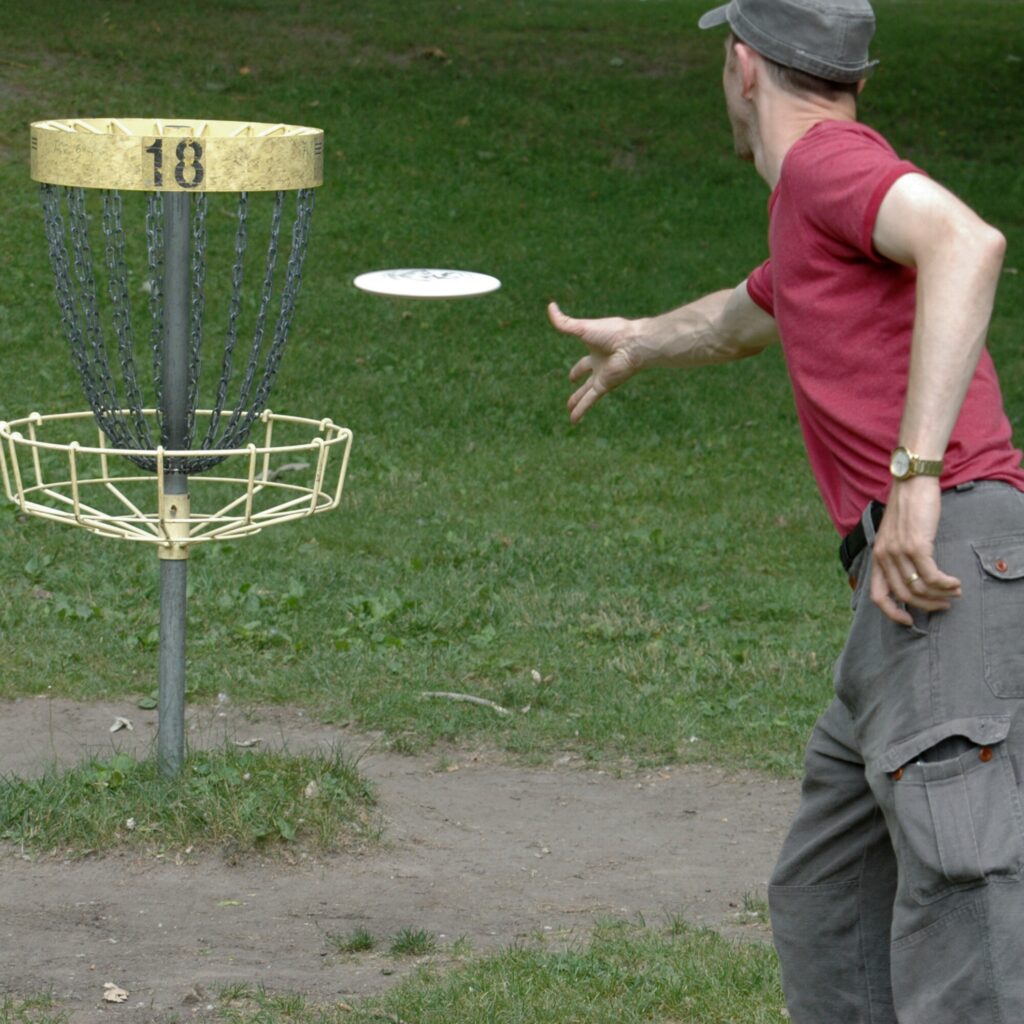
Whether you’re learning the basics of the swing or seeking advanced advice on course strategy, these are accessible resources to help you learn more about how to play and improve your game.
Safety Tips
Warm up before you play. Even though disc golf may seem casual, the throwing motion can strain your shoulders, arms, and back if you’re not prepared. A few minutes of light stretching or warm-up throws can help prevent injury.
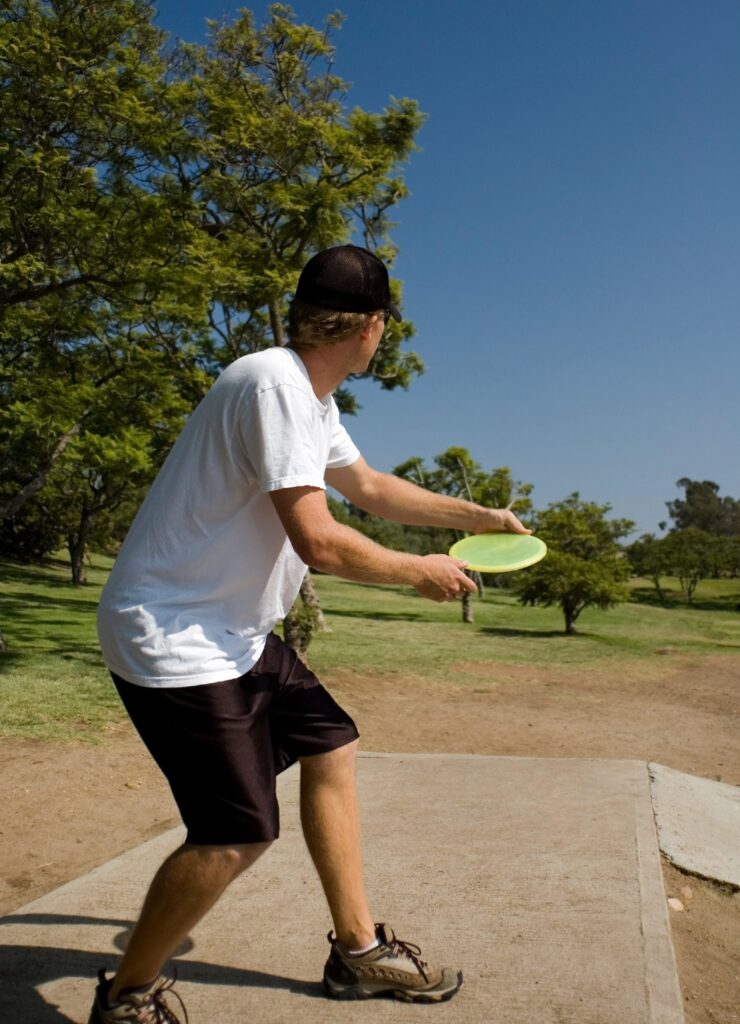
Use proper form. Learning the correct grip, stance, and throwing technique early on reduces the risk of strain and improves your accuracy. Many beginners overexert by trying to throw as hard as possible—focus on smooth, controlled motions instead.
Stay aware of your surroundings. Courses often wind through wooded areas, parks, or open fields. Be mindful of other players, walkers, or pets that may cross your path. Always call out “Fore!” or give a clear warning if your disc heads toward someone unexpectedly.
Protect yourself from the elements. Many courses are outdoors with little shelter, so bring sunscreen, bug spray, and plenty of water. Dress in weather-appropriate clothing and wear comfortable shoes with good traction for uneven terrain.
Mind your discs. Discs can skip or roll after landing, sometimes heading toward water, dense brush, or other hazards. Keep an eye on where your disc lands and avoid unsafe areas when retrieving it. If a disc lands in a river, pond, or thorny underbrush, prioritize your safety over the disc.
Respect course etiquette. Like traditional golf, disc golf has a flow to keep things safe and enjoyable. Wait for the group ahead to finish before throwing, keep noise levels considerate, and let faster groups play through. Picking up after yourself and treating the course with care helps preserve it for everyone.
Know your limits. While it’s tempting to play a full 18 holes right away, beginners may find shorter sessions more enjoyable. Pace yourself, take breaks, and gradually build stamina as you become more comfortable with the game.

Plan for safety. Always let a friend or family member know where you’re playing and when you expect to return, especially if you’re visiting a course you’re unfamiliar with. This simple step ensures someone is aware of your plans in case of an emergency.
Embrace the learning curve. Disc golf is as much about patience as it is about practice. Celebrate small improvements, enjoy the game, and remember that each round offers a chance to grow your skills in a fun, supportive environment.
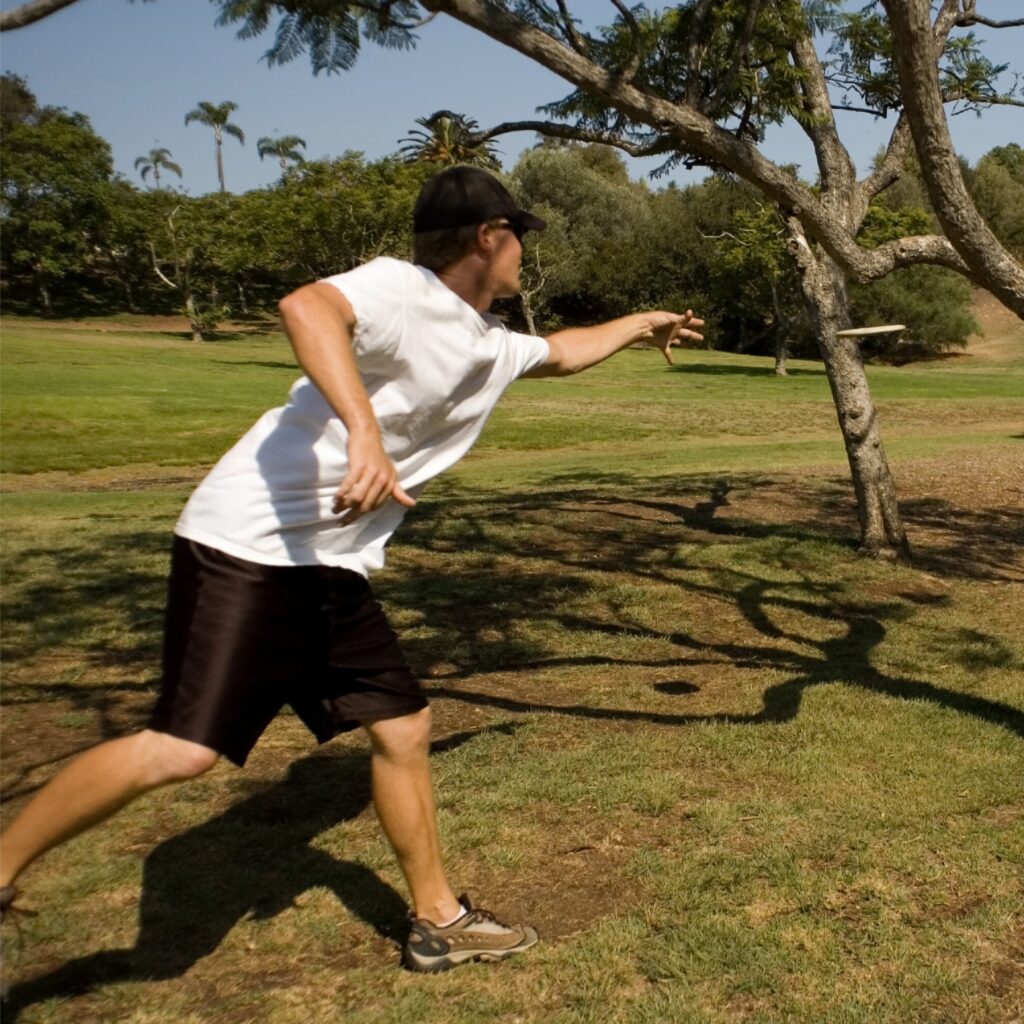
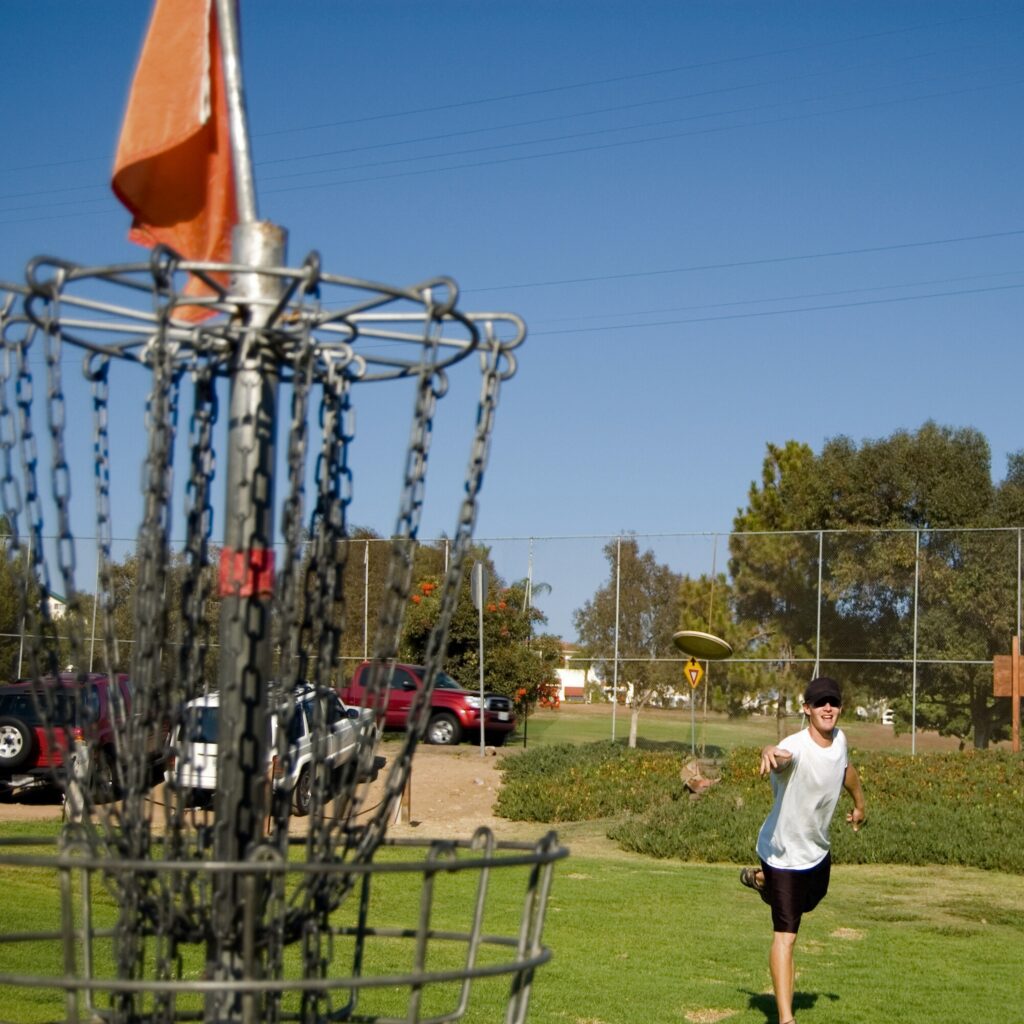
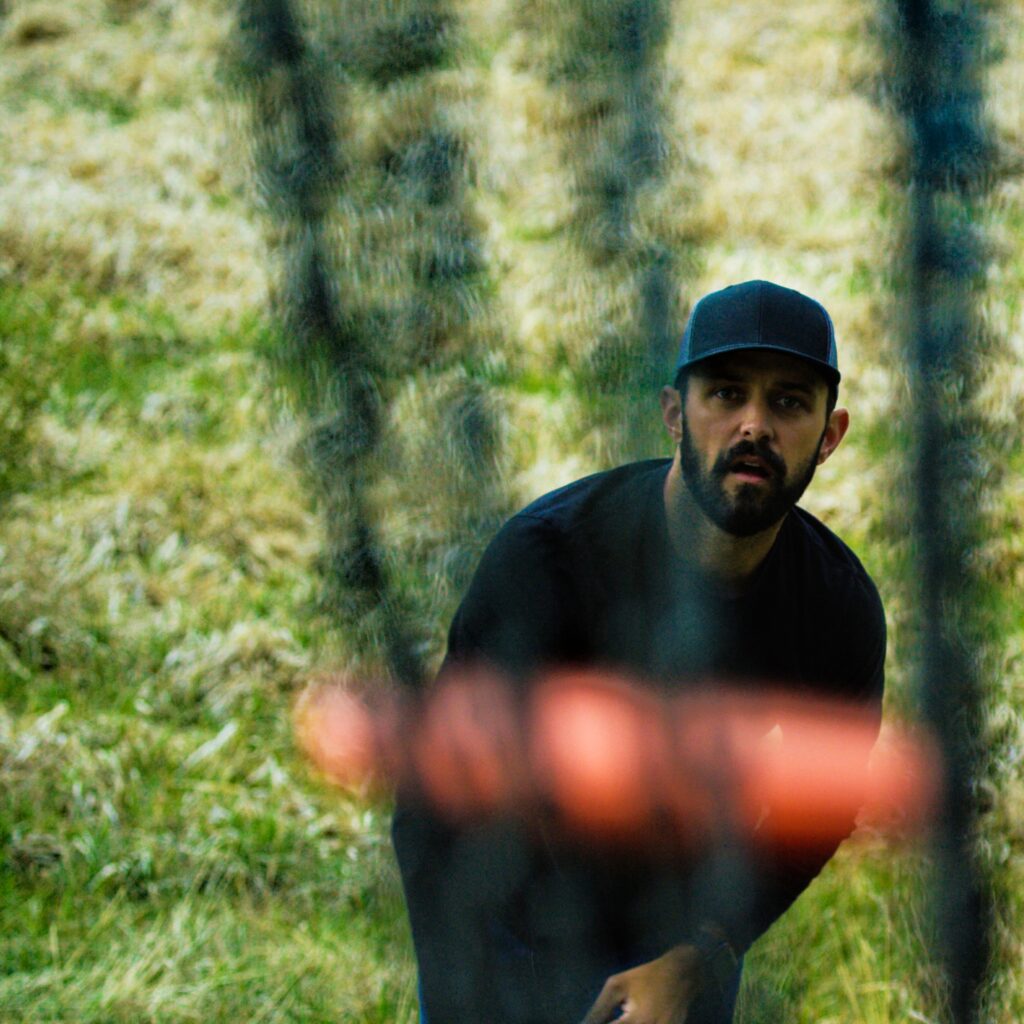
Final Thoughts
Disc golf is more than a game, it’s a blend of movement, strategy, and time spent in the fresh air that invites both challenge and joy. With each throw, you’re not only working on your aim but also finding moments of calm, laughter, and connection. Whether you’re out for a casual round with friends, practicing solo to refine your skills, or exploring a new course, disc golf offers something different every time you play.
It’s a reminder that simple activities can bring meaningful rewards: better health, stronger focus, and the chance to enjoy nature at your own pace. So grab a disc, head to a local course, and see where your throws take you, you may just find a new favorite way to unwind, stay active, and spark joy in your week.
Have you ever played Disc Golf? We’d love to hear about it! Share in the comments below.
Leave a Reply